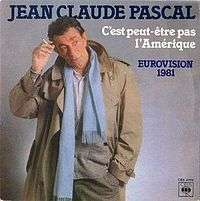C'est peut-être pas l'Amérique
"C'est peut-être pas l'Amérique" (English translation: "It May Not Be America") was the Luxembourgish entry in the Eurovision Song Contest 1981, performed in French by French singer Jean-Claude Pascal. Pascal, along with Luxembourg/France's Anne Marie David, Israel's Izhar Cohen, Ireland's Johnny Logan, Sweden's Charlotte Perrelli and Norway's Alexander Rybak, was one of the very few Eurovision winners to return to the Contest since its inception six decades ago; he had won in 1961 for Luxembourg singing "Nous les amoureux".
 Single cover | |
| Eurovision Song Contest 1981 entry | |
| Country | |
| Artist(s) | |
| Language | |
| Composer(s) | |
| Lyricist(s) | |
| Conductor | Joël Rocher |
| Finals performance | |
| Final result | 11th |
| Final points | 41 |
| Entry chronology | |
| ◄ "Papa Pingouin" (1980) | |
| "Cours après le temps" (1982) ► | |
"C'est peut-être pas l'Amérique" is in praise of Europe and its lifestyle, with Pascal singing that "America isn't everything" and explaining that he prefers the winds of southern France and the music he hears there. Pascal also recorded the song in German, entitled "Heut' ist vieles sehr amerikanisch" ("Today most things are very American").
The song was performed fourth on the night (following Germany's Lena Valaitis with "Johnny Blue" and preceding Israel's Hakol Over Habibi with "Halayla"). At the close of voting, it had received 41 points, placing 11th in a field of 20.
It was succeeded as Luxembourgish representative at the 1982 Contest by Svetlana with "Cours après le temps". Jean-Claude Pascal died in 1992.
Sources and external links
- Official Eurovision Song Contest site, history by year, 1981
- Detailed info & lyrics, The Diggiloo Thrush, "C'est peut-être pas l'Amérique"
- IMDB.com, Jean-Claude Pascal